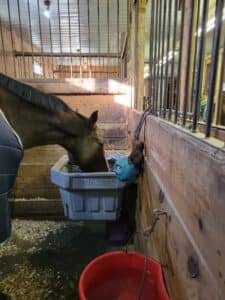It is well known that management factors heavily influence the prevalence of equine gastric ulcer syndrome (EGUS). The research tells us that the top management risk factors are fasting, high starch diets, low roughage diets, transport, and stall confinement as well as stress and administration of non-steroidal anti-inflammatory drugs (NSAIDs).
This case study is the story of a young horse, Dia, and her experience with gastric ulcers prior to beginning to use an OptiMizer slow feeder.
Background
Dia was purchased by her current owner when she was three years old. After a couple of months, she attended a few Cup Classes and then moved to a different boarding facility. After about three months at the new facility, she began showing symptoms of gastric ulcers. Her owner attributed this to the low quality hay, lack of forage availability, and general poor management.
Dia’s veterinarian suspected ulcers and prescribed Omeprazole and Sucralfate for treatment. After multiple months of medication there was noticeable improvement in symptoms. After the course of medications, Dia was put on a gut health supplement, flax oil, a complete feed formulated for horses with ulcers, and beet pulp prior to riding. The owner also tried to build a slow feeder for the stall to ensure there were no periods of fasting. Since the ulcer diagnosis, Dia has moved to a different boarding facility and shown huge improvement. Her owner described her as being back to her normal self!
Dia’s management at the new facility includes being stalled overnight with three flakes of hay. Unfortunately, Dia was consistently out of hay in the morning. Therefore, an improved slow feed option needed to be implemented to prevent the re-occurrence of ulcers. Dia was then selected to be a part of the stall OptiMizer product testing. The OptiMizer was installed, and for the purpose of the case study an independent equine nutritionist visited the farm to evaluate her nutrition.
Equine Nutrition Evaluation
With Dia’s move to the new facility and some feeding recommendations from the veterinarian, her diet was now designed to avoid gastric ulcer re-occurrence. However, horses are grazers, and the majority of their diet is long stem forage (or at least should be!). Therefore, when we have a horse with gastric ulcers that has had re-occurring bouts, addressing the underlying cause is of the utmost importance. For Dia, this meant ensuring that she was not having any fasting periods and that hygienic forage was available all the time.
During the on-farm nutrition evaluation, it was discussed with the owner that Dia had been doing much better but was still consistently out of hay in the morning. The three flakes she was given at night check were just not lasting. The hay OptiMizer was then installed, and management remained the same. She was still fed three flakes. But with the OptiMizer, Dia was consistently having a small amount of hay leftover in the morning!
As an equine nutritionist, it is always amazing to see the horse’s basic foraging needs met. In this situation with a horse that has had repetitive gastric ulcers, finding solutions to work within a management system can make all of the difference. Dia is now not only avoiding any fasting periods, but she is also spending more time chewing. This is ideal because saliva is a buffer for stomach acid. Therefore more chewing = more saliva! All around a great product implementation to improve the management of our horses.

This is a great example of how seeking out ways to improve your horse’s well-being and management can help optimize your horse’s care. Case studies like this are learning tools for other horse owners to be able to read and take valuable information from with hopes of preventing similar situations.
